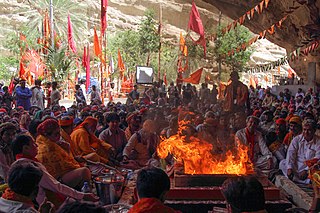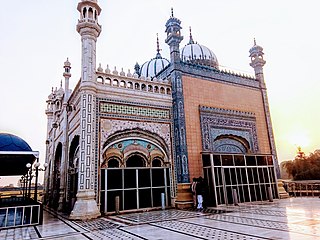Related Research Articles
Hindus have experienced both historical and ongoing religious persecution and systematic violence, in the form of forced conversions, documented massacres, genocides, demolition and desecration of temples, as well as the destruction of educational centres.

Quran desecration is the treatment of the Quran in a way that might be considered insulting.
Pakistan has five major ethno-regional communities in Pakistan: Baloch, Muhajir, Punjabis, Pushtuns and Sindhis, as well as several smaller groups. There are also religious and sectarian groups such as Ahmadis, Christians, Hindus, Kalasha, Parsis and Sikhs, and Shia Muslim sects including Ismailis and Bohras.

Hinduism is the second largest religious affiliation in Pakistan after Islam. While Hinduism was one of the dominant faiths in the region a few centuries back, today Hindus account for only 2.14% of Pakistan's population or about 4.4 million people according to the 2017 Pakistani census. The Umerkot district has the highest percentage of Hindu residents in the country at 52.2%, while Tharparkar district has the most Hindus in absolute numbers at 714,698.

Rahim Yar Khan District is a district in the province of Punjab, Pakistan. Its headquarters is the city of Rahim Yar Khan.

The situation of Human Rights in Pakistan is complex as a result of the country's diversity, large population, its status as a developing country and a sovereign Islamic democracy with a mixture of both Islamic and secular law.

Ghotki District is a district of the province of Sindh, Pakistan, with headquarter in the city of Mirpur Mathelo. Prior to its establishment as a district in 1993, it formed part of Sukkur District.
Daharki is a city in Ghotki District in the Sindh province of Pakistan. It is the capital of Daharki Taluka, an administrative subdivision of the district. It is situated about 100 km northeast of Sukkur, between Mirpur Mathelo and Ubauro on Pakistan's N-5 National Highway. According to the 2017 Census of Pakistan it is the 93rd largest city of Pakistan, having population of 103,557.
Sectarian violence in Pakistan refers to violence directed against people and places in Pakistan motivated by antagonism toward the target's religious sect. As many as 4,000 Shia are estimated to have been killed in sectarian attacks in Pakistan between 1987 and 2007, and thousands more Shia have been killed by Salafi extremists from 2008 to 2014, according to Human Rights Watch (HRW). Sunni Sufis and Barelvis have also suffered from some sectarian violence, with attacks on religious shrines killing hundreds of worshippers, and some Deobandi leaders assassinated. Pakistan minority religious groups, including Hindus, Ahmadis, and Christians, have "faced unprecedented insecurity and persecution" in at least two recent years, according to Human Rights Watch. One significant aspect of the attacks in Pakistan is that militants often target their victims places of worship during prayers or religious services in order to maximize fatalities and to "emphasize the religious dimensions of their attack".
Raherki, also spelled Rahirki, is a village in the Sindh province of Pakistan. It is located along the N-5 National Highway, and lies about 5 kilometres (3.1 mi) away from the city of Daharki. The Mahi Wah river runs through the centre of the village.

Bilawal Bhutto Zardari is a Pakistani politician who served as the 37th Minister of Foreign Affairs, in office from 27 April 2022 to 10 August 2023. He became the chairman of Pakistan People's Party in 2007, following his mother's assassination. Bilawal belongs to the Bhutto family, a prominent political family of Pakistan and is the son of former Prime Minister Benazir Bhutto and President Asif Ali Zardari, and the grandson of former President Zulfikar Ali Bhutto. Bilawal had been a member of the National Assembly of Pakistan from 13 August 2018 till 10 August 2023. He re-elected as Member National Assembly of Pakistan in 2024 Pakistani general election from newly formed constituency NA-194 Larkana-I taken oath February 2024.
The 2009 Gojra riots were a series of attacks targeting Christians in Gojra town in Punjab province of Pakistan. These resulted in the deaths of eight Christians including a child.
Religious discrimination in Pakistan is a serious issue for the human rights situation in modern-day Pakistan. Hindus, Christians, Sikhs, Shias, and Ahmadis among other religious minorities often face discrimination and at times are even subjected to violence. In some cases Christian churches and the worshippers themselves have been attacked. Although, there is very little record of this. Khawaja Nazimuddin, the 2nd Prime Minister of Pakistan, stated: "I do not agree that religion is a private affair of the individual nor do I agree that in an Islamic state every citizen has identical rights, no matter what his caste, creed or faith be".
On March 15, 2014, a crowd of Muslims burnt a Hindu temple and a dharmashala in Larkana, Sindh, Pakistan, after unverified allegations of a Hindu youth desecrating a copy of the Quran.
Abdul Haq is a Muslim cleric and Pakistani politician. He is among the leaders of the Bharchundi Shareef Dargah, and a locally influential figure. Haq was elected to the National Assembly of Pakistan from Constituency NA-200 (Ghotki-I) as a candidate of Pakistan Peoples Party (PPP) in 2008 Pakistani general election. He received 59,022 votes and defeated Khalid Ahmed Khan Lund, a candidate of the Pakistan Muslim League (Q) (PML-Q).

Tehreek-e-Labbaik Pakistan is a far-right Islamic extremist political party in Pakistan. The party was founded by Khadim Hussain Rizvi in August 2015. It was the fifth largest party in Pakistan at the time of the 2018 Pakistani general election, and secured over 2.2 million votes. It failed to win any seat in the National Assembly or the Punjab Assembly, but won three seats in the Sindh Assembly.
Dargah-e-Aliya Bharchundi Shareef Dargah is situated 8 km from railway station of Daharki in Ghotki District in the Sindh province of Pakistan The Bharchundi Sharif is notorious for giving protection to convert to Islam and are known to have the support and protection of ruling political parties and state. According to the media reports, between 2014 and 2017, more than 150 Hindu girls were allegedly forcefully converted to Islam in the Bharchundi Shariff.
On December 30, 2020 the Samadhi of Shri Paramhans Ji Maharaj, a revered Hindu saint and the Krishna Dwara temple situated in the Teri village in the Karak District of Khyber Pakhtunkhwa province of Pakistan was attacked and burned, by a mob of 1,500 local Muslims led by a local Islamic cleric. Following the incident, in order to avoid similar attack on worship places of minorities the "Protection of the Rights of Religious Minorities Bill" was introduced in the Senate of Pakistan. The bill was ultimately turned down by the Senate Standing Committee on Religious Affairs and Interfaith Harmony chaired by Jamiat Ulema-e-Islam (F) (JUI-F) senator Abdul Ghafoor Haideri.
In the Jaranwala church arsons, 26 Christian churches in Jaranwala, Punjab, Pakistan were burnt down by acts of arson, and homes belonging to Christian families were looted and destroyed by Muslim rioters on August 16, 2023; Bible desecration was committed as well. The attacks were carried out by mobs of Muslims who were enraged by allegations that a Christian man had desecrated the Quran. No deaths were reported. More than a hundred rioters, that included members of the far-right group Tehreek-e-Labbaik, have since been arrested.
References
- ↑ "Ghotki mob runs amok after Hindu principal accused of blasphemy". Pakistan Today. Retrieved 2 November 2020.
- 1 2 Jamal Shahid (28 September 2019). "Ghotki riots were pre-meditated, says fact-finding team". Dawn. Retrieved 2 November 2020.
- 1 2 3 4 Sameer Mandhro (16 September 2019). "Blasphemy allegation: Over 200 booked for anti-Hindu riots in Ghotki". Express Tribune. Retrieved 2 November 2020.
- ↑ "Forced conversions of Pakistani Hindu girls". Daily Times. 19 September 2017. Retrieved 2 November 2020.
- ↑ Sameer Mandhro (15 September 2019). "Mob runs riot in Ghotki after Hindu teacher booked for alleged blasphemy". Express Tribune. Retrieved 2 November 2020.
- 1 2 Zubair Qureshi (17 September 2019). "Pakistan temple attack: Muslim locals offer support to Hindus". Gulf news. Retrieved 2 November 2020.
- ↑ "Bilawal visits ransacked temple, mosque in Ghotki". Dawn. 29 September 2020. Retrieved 2 November 2019.
- ↑ Mohammad Hussain Khan (8 September 2019). "Ghotki attacks on Hindu community conspiracy to foment communal unrest,' probe finds". Dawn. Retrieved 2 November 2020.
- ↑ "Hindu teacher acquitted in blasphemy case after five years". The Express Tribune. 2024-03-01. Retrieved 2024-05-03.